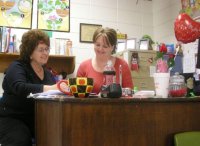Effective Teams: The Key to Transforming Schools?
Your content has been saved!
Go to My Saved Content.This fall I've been thinking a lot about what makes a good team in a school context. I'll share some of these thoughts, but I really want to hear your ideas on this subject.
I'm going to admit that it's taken me a while to feel convinced by the power of teams. Until recently, I didn't have great experiences in teams. I felt that alone I could produce whatever needed to be created better, and quicker, than working with others. I often felt frustrated working in teams -- the process felt so slow and cumbersome. I felt like I was usually given (or took) the bulk of the work. I didn't really know what an effective team looked like, how one worked together, or what the benefits could be.
In the last few years, however, my experience in a couple different teams shifted these beliefs. Now, I'm compelled to figure out how to create and develop good teams -- and to identify the specific moves that a coach or facilitator makes in this process. I want to figure out how to grow powerful teams that can transform schools.
Why Does This Matter?
Here's why I think we need to articulate our beliefs and practices about good teams:
- Strong teams within a school are essential to retaining and sustaining teachers. In schools with low staff turnover (even in challenging urban contexts) teachers report feeling connected to colleagues and supported by them. They also describe feeling that they belong to a team and fulfilling a mission together. The emotions that are activated in this kind of a context are those which keep us engaged in a difficult endeavor for a long time. Public education is a hard place to be these days; we need structures (such as strong teams) which cultivate our emotional resilience
- If a team is effective, then people learn from each other. They accomplish far more than would be possible alone. They inspire and challenge each other. An individual's strengths can be exploited, and we don't have to do the stuff we're not so good at. Again, this is an efficient approach to undertaking a huge project (transforming a school, for example) and it feels good
What Makes a Good Team?
Here are my thoughts. I want to hear yours!
- A good team knows why it exists. It's not enough to say, "We're the sixth grade team of teachers," that's simply what defines you (you teach the same grade) but not why you exist. A purpose for being is a team might be: "We come together as a team to support each other, learn from each other, and identify ways we can better meet the needs of our sixth grade students." Call it a purpose or a mission -- doesn't really matter. What matters is that those who attend never feel like they're just obligated to attend "another meeting." The purpose is relevant, meaningful, and clear.
- A good team creates a space for learning. There are many reasons for which those of us working in schools might gather in a team but I believe that all of those reasons should contain opportunities for learning with and from each other. I have met very few educators who don't want to learn. We're a curious bunch and there's so much to learn about education. So in an effective team, learning happens within a safe context. We can make mistakes and take risks and ask every single question we want.
- In a good team, there's healthy conflict. This is inevitable -- and essential -- if we're learning together and embarked on some kind of project together. We disagree about ideas, there's constructive dialogue and dissent, and our thinking is pushed.
- Members of a good team trust each other. This means that when there's the inevitable conflict, it's managed. People know each other. We listen to each other. There are agreements about how we treat each other and engage with each other and we monitor these agreements. There's also someone such as a facilitator who ensures that this is a safe space. Furthermore, in order for there to be trust within a strong team, we see equitable participation amongst members and shared decision-making. We don't see a replication of the inequitable patterns and structures of our larger society (such as male dominance of discourse and so on).
- Finally, a good team has a facilitator, leader, or shared leaders. There's someone -- or a rotation of people -- who steer the ship. This ensures that there's the kind of intentionality, planning, and facilitation in the moment that's essential for a team to be high functioning.
This last point is what I've been contemplating this fall: What does a good team leader do? How, exactly, does she facilitate? How can leadership rotate or be shared?
I currently work with a fantastic team of instructional coaches and we're thinking about this together; I'm so grateful for this team. We're developing a rubric for coaches for who facilitate teacher and principal workshops -- a tool that identifies and articulates the precise moves we make in order to develop a team that feels purposeful, safe for learning, and that leads to improved outcomes and experiences for the students we serve. We're hoping that this tool will be helpful in our own practice and that it could be useful to others.
In my next post, I'll share some of our ideas about the facilitation moves we make. In the meantime, please share your stories of working in effective teams and your thoughts about what makes a good team.
